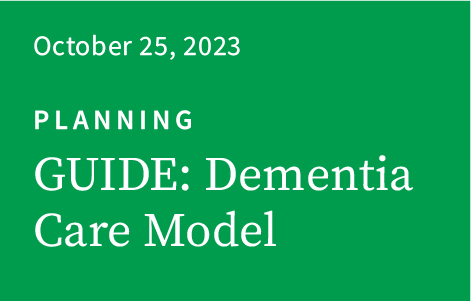Transcript
GUIDE: A Comprehensive Dementia Care Model
On July 31, 2023, the Centers for Medicare & Medicaid Services (CMS) announced a new voluntary nationwide model—the Guiding an Improved Dementia Experience (or GUIDE) model—a pilot that aims to support people living with dementia and their unpaid caregivers. In today’s podcast, I will share a bit about what to expect with the GUIDE model.
But first, some context. We too often hear about the many families and individuals who struggle to find the affordable, high-quality care they need. For elderly people or those living with dementia, long-term care costs have gone up 40 percent in the past decade. The result has been that many Americans—particularly women—stay out of the workforce to care for their families. Caregiving for people with Alzheimer’s or other dementia disorders often includes assistance with bathing and dressing, as well as instrumental activities of daily living, such as paying bills, shopping, and using transportation. Caregivers also provide emotional support to people with dementia, help them manage health conditions, and communicate and coordinate care with other family members and health care providers to ensure safety at home and elsewhere. Then there are the costs of in-home respite care that would allow caregivers to leave the home to go to their own doctors’ appointments, tend to errands, or engage in self-care. Or the cost of a supervised adult day center or respite care facility. According to the Alzheimer’s Association, in 2022 more than 11 million caregivers provided almost 18 billion hours of unpaid care to people living with dementia, at an estimated value of $340 billion.
The thing is, the majority of Americans don’t know this. In my work with families, countless caregivers have told me that when their loved one declines to the point of needing additional support or care, they’ll be able to pay for it through their loved one’s insurance. Or they believe that an assisted living or memory care facility will be covered by Medicare. Not so. Until now, Medicare only covers people for 80 percent of their doctor’s visit costs. All other expenses related to dementia caregiving are out of pocket. As you can imagine, this makes paid services for dementia care unaffordable for the majority of families in our country, and the exorbitant costs lead many families to spend down all of their assets in order to qualify for medical assistance to pay for care.
In April 2023, the Biden administration announced the most comprehensive set of executive actions in U.S. history to support family caregivers. The GUIDE model will focus on dementia care management and will be tested to evaluate whether it is an effective way to improve quality of life for people living with dementia, reduce strain on their unpaid caregivers, and enable people living with dementia to remain in their homes and communities. It will achieve these goals through a comprehensive package of care coordination and care management, caregiver education and support, and respite services.
The purpose of GUIDE is, first, to improve quality of life for people living with dementia by addressing their behavioral health and functional needs, coordinating their care for dementia and co-occurring conditions, and improving transitions between community, hospital, and post-acute settings. The second goal is to reduce burden and strain on unpaid caregivers of people living with dementia by providing caregiver skills training, referrals to community-based social services and support, 24/7 access to a support line, and respite services. The final goal is to prevent or delay long-term nursing home care for as long as appropriate by supporting caregivers and enabling people living with dementia to remain safely in their homes for as long as possible.
How will it work? The GUIDE model will establish dementia care programs to provide ongoing care and support to people living with dementia through an interdisciplinary team. Central to this plan is the participant. The participant is an organization that delivers key support services to people with a dementia diagnosis. Under the model, participants will assign people with dementia and their caregivers to a care navigator. The care navigator is the one who will help families access services and support, including clinical services and non-clinical services such as meals and transportation through community-based organizations.
The GUIDE model will also enhance access to the resources that caregivers need. Unpaid caregivers will have opportunities to receive education and support, such as training programs on best practices for caring for a loved one living with dementia. GUIDE participants will also help caregivers access respite services, which will enable them to take breaks from their caregiving responsibilities, and some of the cost of respite care will be covered under GUIDE.
According to CMS, when used over time, respite services have been found to help unpaid caregivers continue to care for their loved one at home, preventing or delaying the need for facility care. Additionally, the model is designed to reduce Medicare and Medicaid expenditures primarily by helping people with dementia to remain at home, and reducing hospitalization, emergency department use, and the need for post-acute care as well as long-term nursing home care.
In order to be eligible to participate in the GUIDE model, provider applicants must be enrolled in Medicare Part B and be eligible to bill for Medicare Physician Fee Schedule services. They must also agree to meet the care delivery requirements of the model.
There are five ways that the GUIDE model aims to improve dementia care:
- Defining a standardized approach to dementia care delivery for model participants including staffing, services for beneficiaries and their unpaid caregivers, and quality standards.
- Providing an alternative payment methodology to model participants. Participants are the organizations providing care, and CMS will provide monthly per-beneficiary payments to support the team-based collaborative care approach.
- Addressing unpaid caregiver needs by requiring model participants to provide caregiver training and support services, including 24/7 access to a support line, as well as connections to community-based providers.
- Making respite services available to families through the participant, which will partner with local agencies to provide services for in-home care or at adult day centers or facilities that can provide 24-hour care for the purpose of giving unpaid caregivers breaks from their caregiving responsibilities. GUIDE will reimburse families for up to $2500 a year for respite.
- Screening for health-related social needs. GUIDE participants will be required to screen beneficiaries for psychosocial needs and health-related social needs and help them navigate to local organizations to address these needs.
Finally, the GUIDE model has a commitment to delivering equitable care and addressing health disparities in dementia. We know that dementia imposes significant financial, emotional, and logistical burdens on families, burdens that are often exacerbated for certain racial and ethnic groups. Black and Hispanic populations have a higher prevalence of dementia, but studies have shown that they also are less likely to receive a timely diagnosis, have more unmet needs, are more likely to experience high caregiving demands, and spend a higher share of their family assets on dementia care. CMS will actively seek out the participation of eligible organizations that provide care to underserved communities for participation in the GUIDE model.
And now, a call to action. If you are an organization that has an established dementia care program or if you are interested in developing one, consider applying to the GUIDE pilot. If you are the family member of a loved one with dementia, talk to your care provider to find out if they know about the GUIDE program and encourage them to apply. If you are a social worker or other allied health professional supporting families living with dementia, consider reaching out to primary care providers or other health care practitioners in your area and appeal to them to apply. The GUIDE initiative has the potential to make a tremendous impact on dementia care, and participating is the right thing for health systems to do. CMS will release a request for applications sometime this fall. The model will launch in July 2024 and run for eight years. For more information, visit https://www.cms.gov/priorities/innovation/innovation-models/guide.
Felicia Greenfield, MSW, LCSW
Executive Director
Penn Memory Center
www.pennmemorycenter.org

